
With 12 LNG-powered ships already on water, CMA CGM plans to deploy a total of 32 such vessels by 2022. Photo credit: CMA CGM.
CMA CGM plans to deploy six of its newest vessels capable of being powered by liquefied natural gas (LNG) to a trans-Pacific service, part of its recent service offering that will enable customers to reduce their carbon output now and in the future.
The six dual-fuel ships will give the carrier’s US-based customers a path to reduce the carbon footprint of their supply chains, Rodolphe Saadé, chairman and CEO of CMA CGM, said during the opening session of the JOC’s virtual TPM21 conference.
“We will be pioneers in the deployment of LNG vessels from China to Los Angeles-Long Beach,” Saadé told TPM21 attendees.
The 15,000 TEU ships will be rotated into CMA CGM’s Pearl River Express line, operated under the Ocean Alliance vessel sharing agreement, between China and Los Angeles. The first vessel will be delivered in October 2021, and all the ships are expected to be operational by the end of 2022, CMA CGM said.
CMA CGM is the first major container line to have committed to LNG as a shipping fuel for long haul services, having ordered nine LNG-powered vessels of 23,000 TEU back in 2017.
The Marseille-based carrier said the first three of those mega-ships were delivered in late 2020. In December, the carrier announced it would boost its Asia-Europe capacity by 10 percent in the first quarter, with the new capacity coming from the remaining six ships. By 2022, CMA CGM expects to have 32 LNG-powered vessels in service.
There is a growing interest in measuring ocean freight’s impact on climate change and finding ways to reduce it. Increasingly, carriers and forwarders say, the shipper representatives showing up to meetings include sustainability executives, not just the traditional procurement or logistics teams.
In November, CMA CGM said that it would offer shippers a choice to have their freight carried on vessels fueled by LNG or alternative fuels, as well as purchase carbon offsets, as a way to reduce their carbon emissions by up to 85 percent.
Similarly, Maersk announced last week plans to deploy the first zero-carbon container ship, a 2,000 TEU feeder ship, in 2023. Hapag Lloyd has announced orders for six 23,000 TEU dual-fuel LNG ships, while Mediterranean Shipping Co. has stated it will utilize biofuels on certain routes.
LNG has been criticized as a potential sustainable fuel given that vessels running on the alternative fuel only reduce carbon emissions by 20 percent compared with traditional bunkers. According to a 2020 report conducted by the International Council on Clean Transportation (ICCT) on behalf of environmental lobby group Stand.earth, the unintentional release of methane from LNG-fueled engines could actually increase the effects of emissions from the shipping industry on climate change due to the amount of heat it would trap in the atmosphere.
But the increasing retort from ocean carriers who are pursuing a variety of near-term solutions is that in the absence of long-term zero-carbon fuels at global scale, which is not expected to be achieved for years, they need to address growing demands from customers for immediate solutions even if they fall well short of 100 percent decarbonization. Those customers, in turn, are under pressure both from their own customers as well as investors to curb Scope 3 emissions, which include emissions by vendors including transport providers.
“Maybe LNG is not the technology of the future, maybe there are technologies that are far better than LNG,” Saadé said. “But today, what is important is not so much to criticize LNG, but to take action. LNG is the best technology available today.”


